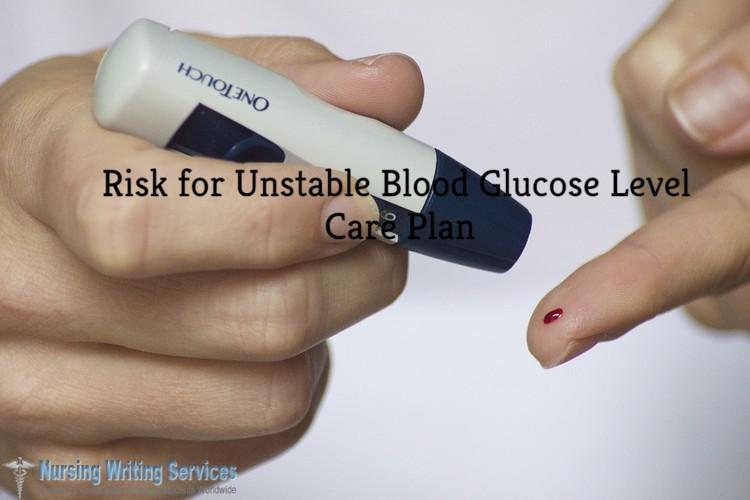
The Risk for Unstable Blood Glucose Level Care Plan Writing Services is about to be vulnerable to a variation of the blood glucose/sugar levels from their normal range. Nursing Writing Services has the most qualified Risk for Unstable Blood Glucose Level Care Plan writers online.
Glucose is just one type of the sugars that humans among others such as fructose from the fruits and lactose from milk. The body converts these other kinds of sugars into glucose for use as energy. Unstable blood glucose can be elevated (hyperglycemia) causing disorders such as diabetes or low (hypoglycemia).
Risk for Unstable Blood Glucose Level Care Plan Diagnosis
A caregiver who thinks that a patient has a risk of unstable blood glucose level can determine its existence by checking the presence of these risk factors.
- Insulin deficiency or excess
- Imbalance of activity
- Stress
- Excessive weight gain or loss
- Insufficient dietary intake
- Less than recommended average daily activity
- Delay in the cognitive development
- Inadequate or non-adherence to diabetes management
- Numerous side effects of medication
Risk for Unstable Blood Glucose Level Care Plan Goals and outcomes
A care plan should have these goals for helping the patient to achieve outcomes that can eliminate or manage the condition for improved life.
- Maintain less than 180 my/Dl glucose reading
- Stay healthy without signs of hyperglycemia or hypoglycemia
- Increase engagement in daily activities
- Increase knowledge of how to and importance of maintaining blood glucose levels at normal levels.
Risk for Unstable Blood Glucose Level Care Plan Assessments and rationales
Assessment is a significant step in identifying the potential problems that could alter blood glucose levels. The following assessments assist the caregivers in developing a care plan that contributes to addressing the condition and handling conflicts that might appear during the nursing care.
Assess the patient for signs of hyperglycemia: Presence of hyperglycemia signals an occurrence of diabetes, and this requires immediate intervention.
Assess the patient for signs of hypoglycemia: Lets the nurse to determines if such symptoms exist and the most effective management
Take the levels of blood glucose before meals and bedtime: It helps to determine if the blood glucose levels are in the normal range and if not the nurse will make arrangement for immediate intervention. It also helps to guide the caregiver on the necessary diet for a patient.
Assess eating patterns: Excessive eating could be a sign of diabetes. The nurse should also determine if a patient who already has diabetes take alcohol as it worsens the condition and hinders management.
Assess level of physical activity: Physical activity helps to lower blood glucose levels thus is necessary that a caregiver determines if a client engages in adequate physical to help in the management of glucose.
Thousands of students around the world get Risk for Unstable Blood Glucose Level Care Plan Writing Services from Nursing Writing Services. Let us write you a perfect paper!
Risk for Unstable Blood Glucose Level Care Plan Interventions and rationales
A care plan for unstable blood glucose level should include therapeutic interventions to help in the management of the condition.
Assist the patient to choose the relevant diet
It lets the patient adjust the food intake to fit limitations of the glucose-rich foods and prevent hyperglycemia as it helps to maintain blood glucose levels and prevents worsening of imbalances. If necessary and possible, a nurse should refer the patient to a dietician who can provide information about the importance of a recommended diet, creating a meal plan and strict adherence.
Administer insulin and hypertensive medications according to prescription
Insulin helps to correct and manage imbalanced glucose levels. Hypertensive medications help to control increased blood pressure caused by diabetes and prevent complications.
Educate the patient on importance of observing prescribed treatment regimen
A patient who understands the importance of treatment will comply with it without viewing it as an unnecessary burden.
Encourage the patient to exercise regularly
Exercising helps to balance the glucose levels. If it necessary that patient engages in a specific exercise program, a nurse should refer the person to an exercise physiologist to train and motivate the patient.
The input of a caregiver is vital as the risk of unstable blood glucose level and any conditions such as diabetes that occur as a result needs strict management to prevent other complications.
Risk for Unstable Blood Glucose Level Care Plan Writing Services
We are one of the few Risk for Unstable Blood Glucose Level Care Plan Writing Services that take seriously the reputation of the writers we employ to work with students. You can never be wrong when you place an order with us. If you are looking for help with Risk for Unstable Blood Glucose Level Care Plan Writing Services, we are the only place that you can be sure of getting value for your money.
Related Services: Best Nursing Writing Service For Nurses



